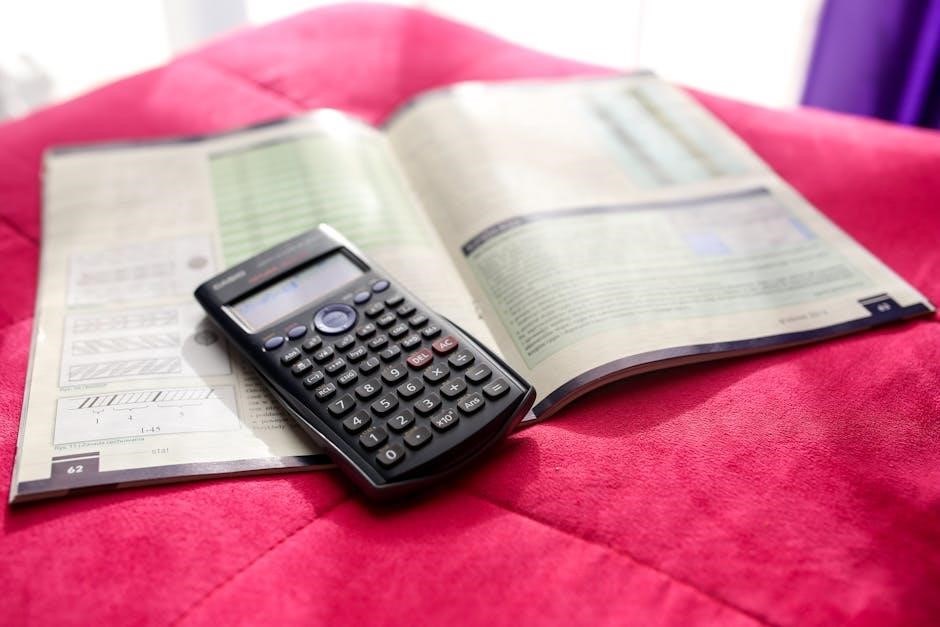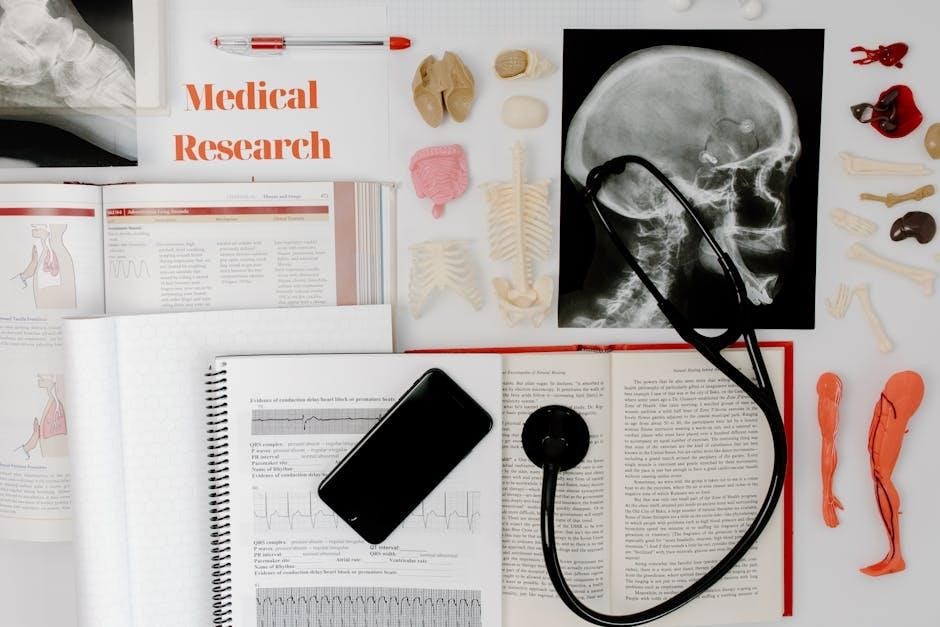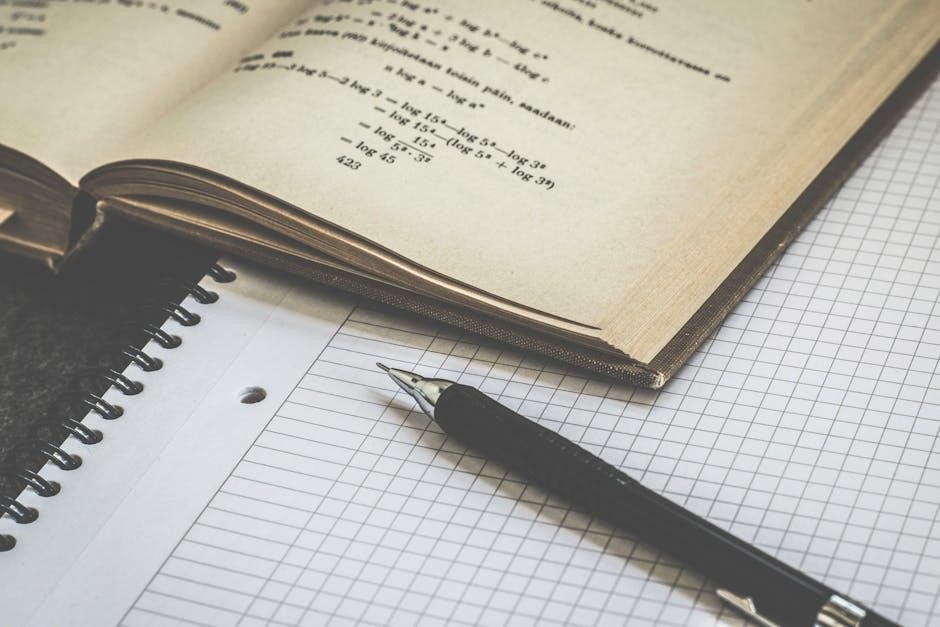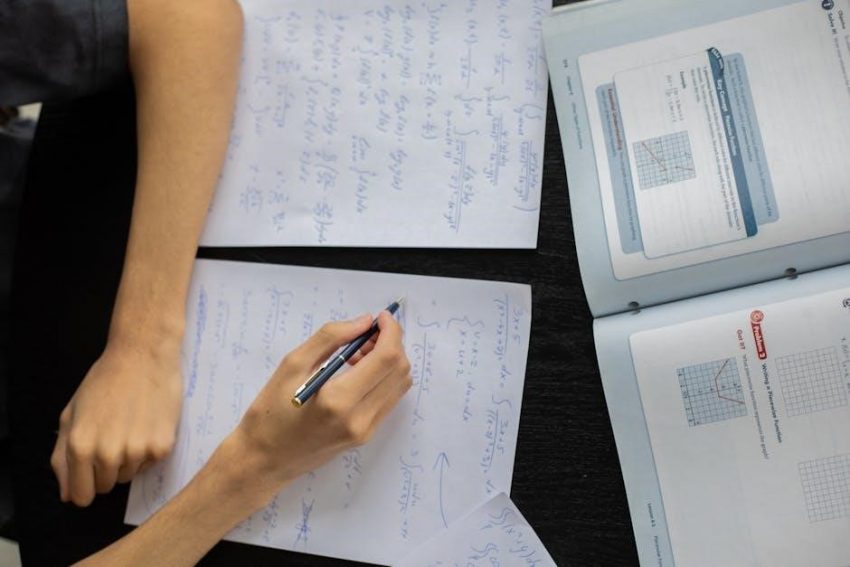Algebra 2 Honors is a rigorous course building on algebraic foundations, focusing on quadratic equations, functions, and polynomials. The required textbook provides comprehensive coverage, with PDF versions offering enhanced accessibility and convenience.

Curriculum Overview
Algebra 2 Honors curriculum provides a comprehensive exploration of advanced algebraic concepts, ensuring a solid foundation for future math studies. Textbooks and online resources support this structured learning path.
2.1 Quadratic Equations and Functions
Quadratic equations and functions are central to Algebra 2 Honors, introducing students to the form (ax^2 + bx + c). These equations are solved using factoring, the quadratic formula, or completing the square. Students explore parabolic graphs, analyzing key features like the vertex, axis of symmetry, and direction of opening. Functions are emphasized, teaching students to interpret (f(x)) notation, determine domains, and identify ranges. Real-world applications, such as projectile motion and area optimization, highlight the practicality of quadratics. Textbooks like E. Swokowski’s Fundamentals of Algebra and Geometry provide detailed explanations and exercises. PDF versions of such textbooks offer convenience, enabling students to practice and master quadratic concepts efficiently. These skills are foundational for advanced math studies, including calculus and trigonometry.
2.2 Functions and Graphs
Functions and their graphical representations are a cornerstone of Algebra 2 Honors. Students explore linear, quadratic, polynomial, exponential, and logarithmic functions, focusing on function notation, domain, and range. Graphing these functions helps identify key features such as intercepts, asymptotes, and transformations. Textbooks emphasize understanding function behavior, inverse functions, and composition, with PDF versions providing interactive graphs for visual learning. Real-world applications, like modeling population growth or financial transactions, illustrate the relevance of these concepts. This section builds a strong foundation for advanced topics such as trigonometry and calculus. Textbooks like E. Swokowski’s Fundamentals of Algebra and Geometry offer detailed explanations and exercises to master function-related skills.
2.3 Polynomials and Their Operations
Polynomials are fundamental in Algebra 2 Honors, involving expressions with variables and coefficients. Operations include addition, subtraction, multiplication, and division. Students learn to combine like terms, factor polynomials, and recognize patterns. Textbooks like E. Swokowski’s Fundamentals of Algebra and Geometry provide detailed practice exercises. Multiplying polynomials often uses the distributive property, while division introduces long division and synthetic division. Factoring techniques, such as difference of squares and grouping, are emphasized. Understanding polynomial behavior, like degree and leading coefficient, is crucial for graphing. PDF versions of textbooks offer interactive examples, aiding in mastering these operations. Regular practice with problem sets ensures proficiency, essential for advanced topics like rational expressions and calculus preparation. These skills form a solid algebraic foundation, with applications in various real-world scenarios.
2.4 Rational Expressions and Equations
Rational expressions and equations involve fractions with polynomials in the numerator and denominator. Students learn to simplify these expressions by factoring and canceling common terms. Solving rational equations requires clearing denominators and checking solutions to avoid extraneous roots. Graphing rational functions helps identify asymptotes and holes, crucial for understanding behavior. Textbooks like E. Swokowski’s Fundamentals of Algebra and Geometry provide detailed examples and practice problems. PDF versions often include interactive tools for visualizing graphs and solving equations step-by-step. Regular practice with problem sets ensures mastery of these concepts, which are foundational for advanced algebra and calculus. Understanding rational expressions and equations enhances problem-solving skills and prepares students for real-world applications in fields like physics and engineering.
2.5 Exponential and Logarithmic Functions
Exponential and logarithmic functions are essential in Algebra 2 Honors, introducing students to growth and decay models. Exponential functions, such as ( y = b^x ), are explored in terms of their graphs, properties, and real-world applications. Logarithmic functions, as the inverse of exponentials, are used to solve equations involving exponents and to analyze data on logarithmic scales. Textbooks often provide detailed step-by-step solutions for simplifying expressions and solving equations. PDF versions of textbooks like E. Swokowski’s Fundamentals of Algebra and Geometry offer interactive features for visualizing function behavior. Regular practice with problem sets helps students master these concepts, which are critical for advanced math courses like calculus and physics. Understanding exponential and logarithmic relationships is vital for solving complex problems in science and engineering.
Trigonometry, a cornerstone of advanced mathematics, is introduced in Algebra 2 Honors to explore relationships between angles and side lengths of triangles. Core concepts include sine, cosine, and tangent functions, defined using right triangles. Textbooks like E. Swokowski’s Fundamentals of Algebra and Geometry emphasize practical applications in physics and engineering. The unit circle is also introduced to extend trigonometric functions to all real numbers. PDF versions of textbooks often include interactive graphs and step-by-step solutions for solving trigonometric equations and proving identities. Regular practice with problem sets helps students grasp these foundational concepts, which are critical for pre-calculus and calculus. Trigonometry is essential for understanding periodic phenomena and solving real-world problems in fields like astronomy and navigation.
2.7 Basic Statistics and Probability
In Algebra 2 Honors, students explore foundational concepts of statistics and probability, essential for data analysis and real-world applications. Topics include probability rules, conditional probability, and Bayes’ theorem. The unit also covers descriptive statistics, such as calculating mean, median, mode, range, and standard deviation. Textbooks like E. Swokowski’s Fundamentals of Algebra and Geometry provide detailed explanations and exercises to master these concepts. Probability distributions, including binomial and normal distributions, are introduced to prepare students for advanced courses. PDF versions of textbooks often include interactive tools and visual aids to simplify complex ideas. Regular practice with problem sets helps students apply statistical methods to interpret and analyze data effectively, fostering critical thinking and problem-solving skills.

Popular Algebra 2 Honors Textbooks
Popular Algebra 2 Honors textbooks include E. Swokowski’s Fundamentals of Algebra and Geometry and the Holt McDougal Algebra 2 book, covering functions, probability, and more. They offer clear explanations and practice problems, with PDF versions available for easy access and study.
3.1 Commonly Used Textbooks and Their Features
Popular Algebra 2 Honors textbooks include E. Swokowski’s Fundamentals of Algebra and Geometry and the Holt McDougal Algebra 2 book. These textbooks are renowned for their structured approach, offering clear explanations, practice problems, and detailed examples. They cover topics such as quadratic equations, polynomials, rational expressions, and exponential functions. Many feature interactive elements, graphs, and real-world applications to enhance understanding. PDF versions of these textbooks are widely available, providing students with convenient access to digital content. Additionally, some textbooks include supplementary materials like workbooks with answer keys, enabling self-study and reinforcing problem-solving skills. Their comprehensive coverage and user-friendly formats make them ideal for both classroom and independent learning environments.
3.2 How to Choose the Right Textbook
Selecting the right Algebra 2 Honors textbook involves evaluating its depth, alignment with the curriculum, and supplementary resources. Ensure it covers advanced topics like quadratic equations, polynomials, and exponential functions. Look for PDF availability from reputable publishers or educational platforms. Consider practice problems, detailed explanations, and real-world applications for engagement. Check for additional resources like online supplements or workbooks. Compare prices and consider older editions for affordability. Opt for a searchable PDF with a clear table of contents. Research the author’s reputation and read reviews to gauge effectiveness. Finally, verify that the textbook aligns with your course curriculum and teaching style for optimal learning.

Study Resources and Materials
Supplement your learning with online resources like Khan Academy, practice workbooks, and study guides. Utilize PDF textbooks for convenience and accessibility, ensuring comprehensive study support.
4.1 Online Resources for Algebra 2 Honors
Online resources are invaluable for mastering Algebra 2 Honors. Platforms like Khan Academy and Coursera offer free video tutorials and practice exercises tailored to algebraic concepts. Additionally, websites such as Quizlet provide interactive flashcards and study games to reinforce understanding. Many educational institutions, including MIT OpenCourseWare, offer free access to detailed lecture notes and problem sets. For visual learners, GeoGebra features interactive math models to explore quadratic functions and polynomials graphically. Furthermore, online forums like Stack Exchange allow students to ask specific questions and receive detailed explanations from experts. These resources complement traditional textbooks and PDF materials, offering flexible and engaging ways to learn complex algebraic principles. Utilizing these tools can significantly enhance study effectiveness and understanding of the course material.
4.2 Practice Problem Sets and Workbooks
Practice problem sets and workbooks are essential for mastering Algebra 2 Honors. They provide structured exercises to reinforce concepts like quadratic equations and polynomials. Many workbooks, such as those accompanying the Holt McDougal or Saxon Algebra 2 textbooks, include detailed solutions to help students identify mistakes. Additionally, specialized workbooks focus on specific areas, such as functions and rational expressions. Regular practice with these materials builds problem-solving skills and confidence. Some workbooks also include cumulative reviews to ensure a strong foundation before advancing. Utilizing these resources alongside textbooks or PDF versions allows for targeted practice and improved understanding of algebraic principles. Consistent use of practice problem sets is crucial for excelling in Honors Algebra 2 and preparing for exams.
4.3 Study Guides and Reference Materials
Study guides and reference materials are invaluable for supplementing Algebra 2 Honors learning. They provide concise explanations, step-by-step solutions, and tips for tackling complex problems. Many publishers offer companion study guides for their textbooks, such as Swokowski’s Fundamentals of Algebra and Geometry, which align with course content. Independent study guides, like those focusing on quadratic equations or exponential functions, can also deepen understanding. Additionally, online reference materials, such as interactive charts or concept summaries, offer flexible learning options. These resources are particularly useful for reviewing difficult topics or preparing for exams. By leveraging study guides, students can fill knowledge gaps and gain confidence in their problem-solving abilities. They serve as a bridge between textbook lessons and practical application, ensuring a stronger grasp of algebraic concepts. Regular use of these tools enhances overall performance in the course.

Utilizing PDF Versions of Textbooks
PDF versions of Algebra 2 Honors textbooks offer unparalleled convenience and accessibility. They allow students to access course materials anywhere, on any device, without the need for physical copies. Legal and reliable PDF sources, such as official publisher websites or educational platforms, ensure that students can study without copyright concerns. Features like search functionality, bookmarks, and highlighting tools make it easier to navigate and review complex topics. Additionally, PDFs can be easily shared and stored, reducing the risk of lost or damaged books. By utilizing PDF textbooks, students can streamline their study process, enhance their learning experience, and stay organized throughout the course.
5.1 Finding Legal and Reliable PDF Sources
Finding legal and reliable PDF sources for Algebra 2 Honors textbooks is essential to ensure compliance with copyright laws and access to high-quality materials. Official publisher websites, educational platforms, and online libraries often provide authorized PDF versions of textbooks. Many schools and universities also offer digital versions of required texts through their portals. Additionally, some authors or publishers share free or discounted PDFs on their websites. Always verify the source’s credibility to avoid unauthorized or pirated content. Platforms like OpenStax or Project Gutenberg offer free, legally available textbooks, though they may not always include the specific Algebra 2 Honors curriculum. By using these reliable sources, students can access the materials they need while supporting ethical publishing practices.

5.2 Benefits of Using Digital Textbooks
Using digital textbooks, such as PDF versions of Algebra 2 Honors materials, offers numerous advantages for students. Digital textbooks are highly accessible, allowing learners to study anytime and anywhere using devices like laptops, tablets, or smartphones. They are also more convenient than physical books, as they take up less space and can be easily organized. Additionally, digital textbooks often include search functions, making it easier to locate specific topics or concepts. Many PDF versions are cost-effective or even free, reducing financial burdens on students. Furthermore, digital textbooks can include interactive elements like hyperlinks, videos, or practice problems, enhancing the learning experience. They also promote environmental sustainability by reducing the need for paper. Overall, digital textbooks provide flexibility, efficiency, and enhanced learning opportunities for students in Algebra 2 Honors courses.
5.3 Effective Strategies for Using PDF Textbooks
To maximize the benefits of using PDF textbooks for Algebra 2 Honors, adopt a structured study approach. Begin by creating a study plan that aligns with your course syllabus, ensuring you cover all chapters systematically. Utilize the search function in PDFs to quickly locate specific topics or formulas, saving time during revisions. Take digital notes using annotation tools or separate documents to summarize key concepts and solved problems. Regularly review and practice problems provided in the textbook, as consistent practice reinforces understanding. Additionally, supplement your studying with online resources, such as video tutorials or practice sets, to deepen comprehension. Organize your digital files by bookmarking important sections and saving links to supplementary materials. Finally, schedule regular breaks to avoid burnout and maintain focus. By combining these strategies, you can effectively use PDF textbooks to excel in Algebra 2 Honors.

Study Tips for Success
- Attend classes regularly and actively participate in discussions to clarify doubts early.
- Seek help from teachers or peers when struggling with concepts to avoid falling behind.
- Utilize online resources like Khan Academy for additional explanations and practice problems.
- Consistently practice problems to reinforce learning and improve problem-solving skills.
- Review notes and textbook sections regularly to build a strong foundation.
- Organize study materials, including digital PDFs, for easy access and efficient studying.
- Take regular breaks to maintain focus and avoid burnout during study sessions.
6.1 Effective Study Strategies for Algebra 2
Mastering Algebra 2 Honors requires a structured approach to studying. Start by setting clear goals for each study session and breaking down complex topics into manageable parts. Regularly review notes and textbook sections, especially from your Algebra 2 Honors textbook or its PDF version, to reinforce concepts. Practice problems consistently, focusing on understanding the process rather than just finding answers. Use online resources like Khan Academy or your textbook’s companion website for additional explanations and exercises; Active participation in class and asking questions helps clarify doubts early. Seek help from teachers or peers when needed, and organize your study materials, including digital PDFs, for easy access. By combining these strategies, you’ll build a strong foundation and confidence in tackling challenging problems.
6.2 Common Mistakes to Avoid
When studying Algebra 2 Honors, several common mistakes can hinder progress. One major error is rushing through problems without fully understanding the underlying concepts. This leads to gaps in knowledge that worsen as the material advances. Another mistake is neglecting to double-check work, resulting in avoidable errors. Overreliance on calculators can also weaken problem-solving skills. Additionally, students often overlook the importance of seeking help when struggling, allowing misunderstandings to grow. Procrastination and poor time management during exams are frequent pitfalls, causing unnecessary stress and missed opportunities. To succeed, focus on understanding concepts, practicing regularly, and utilizing resources like your Algebra 2 Honors textbook or its PDF version for consistent review and practice.

Exam Preparation
Effective exam preparation involves regular practice with timed problems, reviewing key concepts from your Algebra 2 Honors textbook or its PDF version, and focusing on weak areas to build confidence and accuracy.
7.1 Tips for Preparing for Algebra 2 Honors Exams
Success in Algebra 2 Honors exams requires a strategic approach. Start by creating a study schedule, focusing on weak areas identified through practice problems. Use the PDF version of your textbook to review key concepts, such as quadratic equations and exponential functions, and practice past exams under timed conditions. Prioritize understanding over memorization, as this enhances problem-solving skills. Additionally, organize your notes and summaries for quick reference, and seek clarification on difficult topics from teachers or online resources. Regularly test yourself with practice sets to build confidence and accuracy. By combining consistent practice with a deep understanding of the material, you’ll be well-prepared for exam success.

7.2 Common Exam Mistakes and How to Avoid Them
Common mistakes in Algebra 2 Honors exams often include rushing through problems, misreading questions, and miscalculations. To avoid these, allocate time to carefully read each question and plan your approach. Regular practice with the PDF textbook helps identify patterns in errors, allowing you to focus on weak areas. Additionally, ensure accuracy by checking your work step-by-step. Time management is crucial; allocate proportionate time to each question to avoid skipping harder problems. Lastly, stay calm and manage exam stress, as anxiety can lead to avoidable mistakes. By addressing these common pitfalls, you can improve your performance and achieve better results.

The Role of Community and Support
Engaging with online communities and forums provides valuable support for mastering Algebra 2 Honors. Sharing ideas and resources with peers fosters collaboration and understanding, while tutors offer personalized guidance.
8.1 Importance of Online Communities and Forums
Online communities and forums play a vital role in supporting students studying Algebra 2 Honors. These platforms provide spaces for collaboration, resource sharing, and problem-solving discussions. Students can engage with peers and educators, fostering a sense of belonging and motivation. By participating in these communities, learners gain access to diverse perspectives and strategies, enhancing their understanding of complex topics. Additionally, forums allow students to ask questions, receive feedback, and clarify doubts in real time. This interactive environment helps build confidence and improves problem-solving skills. Many online communities also offer access to supplementary materials, such as practice problems and study guides, further enriching the learning experience. Overall, these forums serve as invaluable tools for students navigating the challenges of Algebra 2 Honors, bridging the gap between traditional classroom learning and modern digital resources.
8.2 Seeking Help from Tutors or Peers
Seeking help from tutors or peers is a powerful strategy for mastering Algebra 2 Honors. Tutors provide personalized guidance, addressing specific areas of difficulty and offering tailored explanations. Peers can also share insights, fostering collaborative learning and mutual understanding. This support system helps students grasp complex concepts, such as quadratic equations and polynomial operations, more effectively; By discussing challenges with others, learners can identify knowledge gaps and refine their problem-solving techniques. Additionally, peer-to-peer learning encourages active participation and reinforces retention of material. Utilizing the resources from a PDF textbook alongside tutoring or study groups maximizes learning efficiency. This collaborative approach not only enhances academic performance but also builds confidence and resilience in tackling advanced mathematical topics. Ultimately, seeking help from tutors or peers creates a well-rounded support network essential for success in Algebra 2 Honors.
